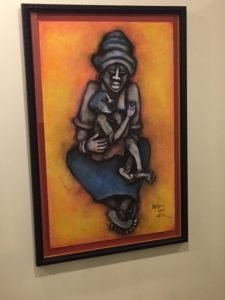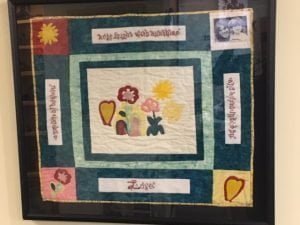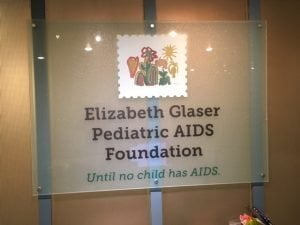Better Than Most is a regular feature of The Business of Giving, examining the best places to work among social good businesses and nonprofit organizations.
Denver: And tonight, we will be visiting the Elizabeth Glaser Pediatric AIDS Foundation in Washington, D.C., an organization that seeks to end pediatric HIV/AIDS through prevention and treatment programs, research, and advocacy. We’ll begin the segment with their CEO Chip Lyons, and then hear from some of the other members of the team.
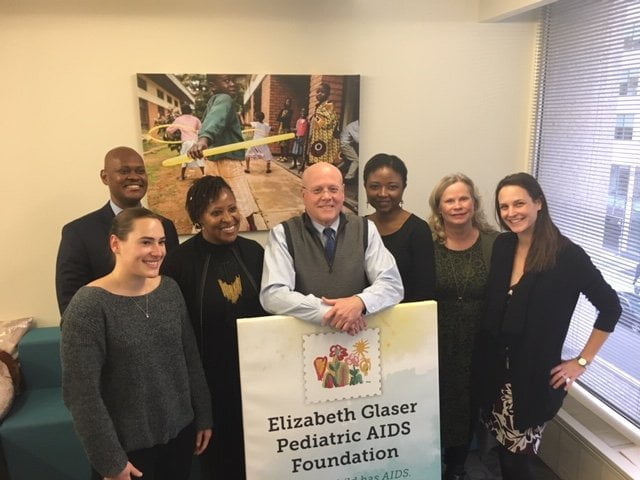
Chip Lyons: Elizabeth Glaser spoke at the Democratic National Convention in Madison Square Garden in 1992. It was booked in the afternoon, which anyone that watches political conventions, that’s not the main event or the main speaker, and yet the convention members were just in rapt attention at this woman — heterosexual, white woman — explaining she had HIV. At that time, it was not thought of as family affliction necessarily or one that affected children particularly. In so many ways, she woke the United States up to the complexities and intensity of HIV and AIDS in the United States.
Tami Ward-Dahl: If I think about a number of interviews, people are so worried about selling themselves that they don’t even talk about the mission. Certainly, we ask some very pointed questions, but it’s almost like, sometimes for individuals, it’s an after-thought. And what really makes the difference is when it leads…when it is the driver that makes someone say, “I really want to be at the foundation.”
Caroline Zinyemba: For folks like me working in the field, where we are at the epicenter of the whole HIV epidemic in the country — I come from Zimbabwe; it’s one of the hardest hit, especially with mother-to-child transmission — the personal connection is, every day, these are part of my family; these are friends; these are relatives. So working for an organization that is actually bringing real, tangible change to people’s lives, to the lives of my compatriots, to the lives of my family, and having children that are healthy, that are happy, is deeply personal.
Stephen Lee: The culture here is one of respect and a commitment to excellence. The way (respect) is demonstrated is in just the way we treat each other. We’re very… I’m going to steal something from one of my colleagues potentially. We are an organization that values people’s time. We value different work approaches and different work styles. We value the various backgrounds that people come here with; We have folks from all over the globe. We value that diversity that they bring to the organization.
Rachel McMahon: We’re all motivated but we come from a place of how do we move past that and not be so defeated by any challenge that we’re faced with. I think that is represented within the foundation but also, you can see it through people’s lives outside of the foundation. It’s something that all of the staff bring from their own personal experience. You can see it in the corporate culture. We go on hikes on the weekend. It’s not people sitting around twiddling their thumbs. Everybody is very, very motivated in their personal lives and in their work-life as well.
Rantimi Adetunji: In my last one year, one thing I’ve noticed is that people at this organization is agile. That we can easily move. We take knowledge because we have a research arm, the People in Learning. We take the learnings we have and immediately, it’s being implemented in the field because it’s one organization. Because usually, it takes sometimes 10 years for innovations to diffuse through and be adopted but that’s not the case. An example is, I did a cost analysis for one of our country teams. They were doing a community-based intervention for identifying people with HIV. Within two months, they had re-strategized to make sure that they were using less resources but still optimizing results. For me, that brings me joy; it gives me the motivation to get up in the morning because every day is a good day to add to this work.
Cosima Lenz: There are certain traditions that the organization maintains especially when employees hit certain milestones in working for the organization. Since I just hit my one-year mark, I will be receiving, or so I’ve been told, a small tequila shot glass with the EGPAF emblem and some M&Ms, which is really symbolic because the tequila shot sort of goes back to Elizabeth Glaser and her co-founders, Susan and Susan, where they celebrated receiving grants in the beginning of the organization. It really speaks to that. She really enjoyed M&Ms, as I’m told which I appreciate. I’ve also heard that there’s some debate as to whether you’re supposed to consume or not consume the M&Ms.
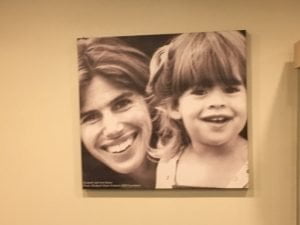 Tami Ward-Dahl: I just wanted to comment on one of the ways that we recognize our staff. As you know, we’ve been talking about our history and our passion, but one of the ways that we do it is through a product called the Ariel Heart of Gold. That was Elizabeth’s daughter’s name. It’s very special to us at the foundation. It’s a way that we can recognize staff, either peer to peer… It’s a way that we get to recognize staff for things that they do that are important to us throughout the organization. on a day to day basis.
Tami Ward-Dahl: I just wanted to comment on one of the ways that we recognize our staff. As you know, we’ve been talking about our history and our passion, but one of the ways that we do it is through a product called the Ariel Heart of Gold. That was Elizabeth’s daughter’s name. It’s very special to us at the foundation. It’s a way that we can recognize staff, either peer to peer… It’s a way that we get to recognize staff for things that they do that are important to us throughout the organization. on a day to day basis.
Rantimi Adetunji: There are many opportunities to learn about what’s going on across the world essentially – webinars, brown bags. One thing that stands out to me is that the knowledge flow is back and forth. It’s from the south to north, from north to south. There’s not one dominance of like, “We are the generator of knowledge.” There’s a co-creation of knowledge taking place across the foundation, regardless of the geography of where employees are. You’ll see it in our published papers that the authors are not only HQ based. It’s all over the organization.
Cosima Lenz: When people, employees, see an organization invest in their personal growth and their professional growth, then they are more willing to stay. That manifests itself in a variety of ways, either in mentorship through their teams, or getting the opportunity to travel and work with country teams… or internally, we have an e-learning platform where we can take a variety of courses or classes that are offered, which allows you to use more tangible tools in everyday work, which is also really cool.
Stephen Lee: One of the areas for opportunities for growth was around building manager’s capacity and ability to really strengthen their one-on-one relationship with their supervisees and giving managers the tools to have not just difficult conversations but giving managers the tool to ask questions about professional development, to ask questions around day-to-day capacity to get work done. Each year, in my team, I can see that we’re improving in the feedback that we get from our staff. Based on that initial survey, that became a standing goal and objective on my team. Its goal #4, I think, on my team, is leadership and management capacity building.
Caroline Zinyemba: I’m a proud member of the Zimbabwe Fun Committee. Every Friday, the Zimbabwe office gets together — from 8:00 to 8:30 morning — for 30 minutes. We talk about anything. Every staff gets to pick a topic – it could be the cleaner; it could be the driver or the country director herself. Everybody gets to present. They pick a topic of what they’re passionate about. It doesn’t have to be work-relate. It can be work-related. And they present. Staff really look forward to that. I think it came out in the engagement survey. Hundred percent of the staff really look forward to that time on Friday where we get together and just break down the silos and just be together as a family.
Rachel McMahon: Also I think representative of that, we just recently remodeled the third floor. One of the conference rooms has been set up in a way to have a cafeteria. It’s blocked off from 11:00 to 1:00, or something like that, and there are roundtables where people can bring their lunch and sit and have that time to enjoy your food but also to speak with your colleagues, which is really nice.
Chip Lyons: I think what’s expected of people here is that they are problem solvers. They are expected to lead in their unit, in their department, in the organization, in their country, in the region, in the world. There’s a leadership that is expected of this organization at a variety of different levels. And it’s provided I think by so many people in this organization at multiple levels. What has struck me about – I’ve been here eight-plus years. I’ve worked in other organizations that are pretty well known. Despite the high level of expectation of leadership and accomplishment and impact, this is the least egocentric organization that I’ve worked in, and I think it goes back to your comment about certain values are created or are imbued in an organization at its founding; part of the founding creed, if you will, and I think it’s another aspect of Elizabeth Glaser and the importance of her work and leadership in changing how people talk about HIV and AIDS in the United States at that time; but in setting out an organization that has a certain set of values so that 30 years later, it’s still doing the kind of work that she would be proud of.

Denver: I would like to thank Eliza Dryer and Meghan Quinn for organizing my visit and to all those who participated in this piece: Stephen Lee, Cosima Lenz, Rachel McMahon, Rantimi Adetunji, Tami Ward-Dahl, Carolyn Zinyemba, and Chip Lyons. To hear this again, read the transcript or see pictures of the participants and the offices of the Elizabeth Glaser Pediatric AIDS Foundation, simply come visit denver-frederick.com.
The Business of Giving can be heard every Sunday evening between 6:00 p.m. and 7:00 p.m. Eastern on AM 970 The Answer in New York and on iHeartRadio. You can follow us @bizofgive on Twitter, @bizofgive on Instagram and at http://www.facebook.com/BusinessOfGiving


